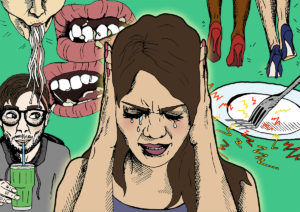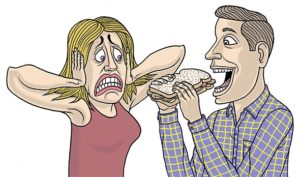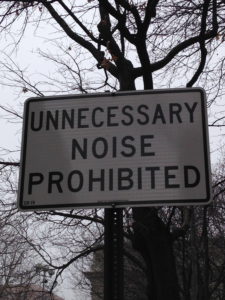What Is Misophonia?
 Hearing is perhaps the sense that people mistreat the most throughout their lives, especially in their earlier years. Going to loud concerts without earplugs, listening to music at high volumes through in-ear earphones, and various other things that we pay little thought to can come back in a very frightening way in the future. Misophonia is a troubling hearing condition that affects a person’s daily life, causing significant discomfort – and in some cases even distress – when certain specific sounds can be heard in the vicinity.
Hearing is perhaps the sense that people mistreat the most throughout their lives, especially in their earlier years. Going to loud concerts without earplugs, listening to music at high volumes through in-ear earphones, and various other things that we pay little thought to can come back in a very frightening way in the future. Misophonia is a troubling hearing condition that affects a person’s daily life, causing significant discomfort – and in some cases even distress – when certain specific sounds can be heard in the vicinity.
What Are the Symptoms?
 The main symptom of misophonia and the one people typically associate with the condition the most, is a general sense of extreme discomfort when a specific sound is heard. Different people respond to different sounds, and there doesn’t seem to be a common theme in what could trigger the condition. It’s also possible that the spectrum of harmful sounds can change over time, although reports on that seem to be somewhat conflicting at the moment.
The main symptom of misophonia and the one people typically associate with the condition the most, is a general sense of extreme discomfort when a specific sound is heard. Different people respond to different sounds, and there doesn’t seem to be a common theme in what could trigger the condition. It’s also possible that the spectrum of harmful sounds can change over time, although reports on that seem to be somewhat conflicting at the moment.
How Does It Develop?
The exact mechanism behind the development of misophonia is still largely unknown, and the main hypothesis right now is that it has something to do with a malfunction in the nervous system. In that sense, misophonia appears to be a neurological disorder rather than a physical one related to the condition and healthiness of the ears. No concrete link has been established so far between a lifestyle that protects a person’s ears against hearing damage and the development of misophonia, although it certainly can’t hurt to ensure that the ears are treated with enough care and attention.
What Can I Do if I Have Misophonia?
 Medical science is still dealing with the problems caused by misophonia in somewhat experimental ways, although there are certain management courses established so far that seem to be showing good prospects. Treatment mostly boils down to learning how to cope with the situation and how to isolate the specific sounds that trigger it, although due to the way this therapy typically works, it’s not recommended to attempt it on one’s own. Professional assistance is strongly recommended to maximize the chances of seeing good results.
Medical science is still dealing with the problems caused by misophonia in somewhat experimental ways, although there are certain management courses established so far that seem to be showing good prospects. Treatment mostly boils down to learning how to cope with the situation and how to isolate the specific sounds that trigger it, although due to the way this therapy typically works, it’s not recommended to attempt it on one’s own. Professional assistance is strongly recommended to maximize the chances of seeing good results.
If you’re suffering from misophonia – or believe you may be – and are not sure what to do, don’t postpone treatment any further. Get in touch with us today and set up an appointment with the best misophonia specialists in NYC, and you’ll feel the difference in the quality of your daily life in no time!
